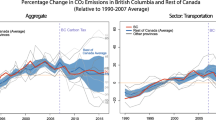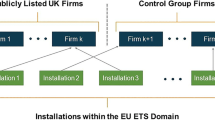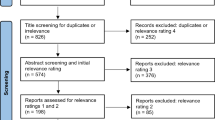Abstract
This study investigates the effect of a CO2 tax on profitability by using firm-level data on output and inputs from Swedish industry between 1990 and 2004. The purpose of this exercise is to investigate the validity of the so-called Porter hypothesis. By utilizing a factor-demand modeling approach, and specifying a profit function that has a technology component dependent upon firm-specific effective tax on CO2, we are able to separate out the effect of regulatory pressure on technological progress. The results indicate that there is evidence of a “reversed” Porter effect in most industrial sectors, especially in energy-intensive industries; that is, after controlling for the fuel price effect, technological progress and consequently profits are further negatively affected by the CO2 tax.
Similar content being viewed by others
References
Alpay E, Buccolaand S, Kerkvliet J (2002) Productivity growth and environmental regulation in Mexican and U.S. food manufacturing. American Journal of Agricultural Economics 84:887–901
Barbera AJ, McConnell VD (1990) The impact of environmental regulations on industry productivity: direct and indirect effects. Journal of Environmental Economics and Management 18:50–65
Bergman MA (1996) Estimating Investment Adjustment Costs and Capital Rates from the Production Function, Umeå Economic Studies 406, Umeå University, Sweden
Berman E, Bui LTM (2001) Environmental regulation and productivity: evidence from oil refineries. The Review of Economics and Statistics 83:498–510
Brännlund R, Lundgren T (2007) Swedish industry and Kyoto—an assessment of the effects of the European CO2 emission trading system. Energy Policy 35:4749–4762
Brännlund R, Lundgren T (2009) Environmental policy without costs? A review of the Porter hypothesis. International Review of Environmental and Resource Economics 3:1–43
Brunnermeier SB, Cohen MA (2003) Determinants of environmental innovation in US manufacturing industries. Journal of Environmental Economics and Management 45:278–293
Cole MA, Elliot RJ (2007) Do environmental regulations cost jobs? An industry-level analysis of the UK. The BE Journal of Economic Analysis and Policy vol 7, article 28
Feichtinger G, Hartl RF, Kort PM, Veliov VM (2005) Environmental policy, the Porter hypothesis and the composition of capital: effects of learning and technological progress. Journal of Environmental Economics and Management 50:434–446
Gabel LH, Sinclair-Desgagné B (1998) The firm its routines, and the environment. In Folmer H, Tietenberg T (eds.), The International Yearbook of Environmental and Resource Economics 1998/1999. Edward Elgar publishing company
Gabel LH, Sinclair-Desgagné B (2001) The firm its procedures and win-win environmental regulations. In Folmer H, Gabel LH, Gerkin S, Rose A (eds.), Frontiers of Environmental Economics. Edward Elgar publishing company
Gollop FM, Roberts MJ (1983) Environmental regulations and productivity growth: the case of fossilfuelled electric power generation. Journal of Political Economy 91:654–674
Gray WB, Shadbegian RJ (1998) Environmental regulation, investment timing, and technology choice. Journal of Industrial Economics 46:235–256
Gray WB, Shadbegian RJ (2003) Plant vintage, technology, and environmental regulation. Journal of Environmental Economics and Management 46:384–402
Greaker M (2006) Spillovers in the development of new pollution abatement technology: a new look at the Porter-hypothesis. Journal of Environmental Economics and Management 52:1411–1420
Hamamoto M (2006) Environmental regulation and the productivity of Japanese manufacturing industries. Resource and Energy Economics 28:299–312
Hammar H, Lundgren T, Sjöström M (2008) The significance of transport costs in Swedish forest industry. Journal of Transport Economics and Policy 42:83–104
Hammar H, Lundgren T, Sjöström M, Andersson M (2009) The kilometer tax and Swedish industry—effects on industry sectors and regions. Applied Economics. doi: 10.1080/00036840802600608
Jaffe AB, Palmer K (1997) Environmental regulation and innovation: a panel data study. Review of Economics and Statistics 79:610–619
Jaffe AB, Peterson SR, Portney PR, Stavins RN (1995) Environmental regulation and the competitiveness of U.S. manufacturing: what does the evidence tell us? Journal of Economic Literature 33:132–163
Jorgenson DW (1963) Captial Theory and Investment Behavior, American Economic Review 53:247–259
King MA, Fullerton D (1984) The Taxation of Income from Capital, The University of Chicago Press, Chicago and London
Lanoie P, Patry M, Lajeunesse R (2008) Environmental regulation and productivity: testing the Porter hypothesis. Journal of Productivity Analysis 30:121–128
Managi S, Opaluch J, Jin D, Grigalunas T (2005) Environmental regulations and technological change in the offshore oil and gas industry. Land Economics 81:303–319
Mohr RD (2002) Technical change, external economies, and the Porter hypothesis. Journal of Environmental Economics and Management 43:158–168
Nickell SJ (1978) The Investment Decisions of Firms, Cambridge Economic Handbooks, University Press, Oxford, UK
Palmer K, Oates WE, Portney PR (1995) Tightening environmental standards: the benefit-cost or the no-cost paradigm? Journal of Economic Perspectives 9:119–132
Piot-Lepetit I, Le Moing M (2007) Productivity and environmental regulation: the effect of the nitrates directive in the French pig sector. Environmental and Resource Economics 38:433–446
Popp D (2002) Induced innovation and energy prices. American Economic Review 92:160–180
Popp D (2005) Lessons from patents: using patents to measure technological change in environmental models. Ecological Economics 54:209–226
Porter ME (1991) America's green strategy. Scientific American 264:168
Shadbegian RJ, Gray WB (2005) Pollution abatement expenditures and plant-level productivity: a production function approach. Ecological Economics 54:196–208
Simpson D, Bradford RL (1996) Taxing variable cost: environmental regulation as industrial policy. Journal of Environmental Economics and Management 30:282–300
Smith JB, Sims WA (1985) The impact of pollution charges on productivity growth in Canadian brewing. Rand Journal of Economics 16:410–423
van der Linde, Porter M (1995) Toward a new conception of the environment competitiveness relationship. Journal of Economic Perspectives 9(4):97–118
van der Vlist AJ, Withagen C, Folmer H (2007) Technical efficiency under alternative environmental regulatory regimes: the case of Dutch horticulture. Ecological Economics 63:165–173
Xepapadeas A, de Zeeuw A (1999) Environmental policy and competitiveness: the Porter hypothesis and the composition of capital. Journal of Environmental Economics and Management 37: 165–182
Author information
Authors and Affiliations
About this article
Cite this article
Brännlund, R., Lundgren, T. Environmental policy and profitability: evidence from Swedish industry. Environ. Econ. Policy Stud. 12, 59–78 (2010). https://doi.org/10.1007/s10018-010-0163-8
Received:
Accepted:
Published:
Issue Date:
DOI: https://doi.org/10.1007/s10018-010-0163-8




